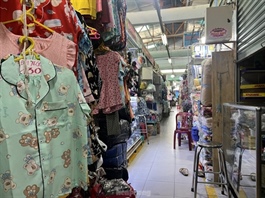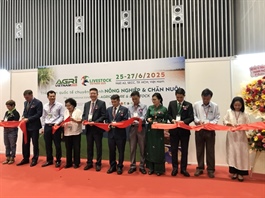Crypto transaction regulations more sophisticated than ever
Crypto transaction regulations more sophisticated than ever
Under the new Law on Digital Technology Industry, to come into effect in 2026, digital assets are officially recognised, encompassing both virtual assets and cryptoassets, while excluding securities, digital fiat currencies, and other financial instruments.

Dr. Le Thi Thuy Van, vice president National Institute for Finance Ministry of Finance |
The law also mandates the adoption of cybersecurity safeguards and anti-money laundering frameworks in line with international best practices, in a move likely aimed at addressing concerns raised by the Financial Action Task Force (FATF).
The rise of cryptoassets introduces complex challenges in the regulatory and supervisory landscape. Among these, anti-money laundering (AML) regulation has become increasingly sophisticated and difficult due to the advancement of technology, requiring regulators to study international best practices and flexibly adapt them to their own socioeconomic contexts.
According to Chainalysis in 2024, Vietnam ranks fifth globally in cryptocurrency ownership, following India, Nigeria, Indonesia, and the US. Between July 2022 and June 2023, crypto and virtual asset inflows into Vietnam reached approximately $120 billion, while Vietnamese investors generated nearly $1.18 billion in profits from crypto investments. This places Vietnam third worldwide in crypto investment returns, behind only the US with $9.36 billion and the UK with $1.39 billion.
The 2020 Law on Investment does not prohibit the organisation of business activities involving crypto or virtual assets, nor does it include such activities in the list of restricted sectors for foreign investors. This legal gap has created opportunities for some individuals and entities to exploit the ambiguity to engage in multi-level marketing schemes, fraud, money laundering, and other illicit practices.
As Vietnam was placed on the FATF grey list for jurisdictions requiring enhanced AML measures, including for crypto, the government in 2024 outlined a national action plan to fulfil its commitments on AML, counter-terrorist financing (CTF), and counter-proliferation financing.
Under the plan, the Ministry of Finance (MoF) was assigned to develop a legal framework to either prohibit or regulate virtual assets and virtual asset service providers, and demonstrate enforcement, including compliance measures by May 2025.
Earlier this year, the MoF, in coordination with the State Bank of Vietnam (SBV), was also tasked with building a legal framework to foster the sound development of digital assets and digital currencies.
Following this, in March, the prime minister called for the MoF to finalise a draft resolution on a pilot regulatory framework for managing crypto asset-related activities. The pilot aims to provide a practical basis for evaluation and eventual establishment of a feasible, official legal framework for crypto issuance and trading in Vietnam.
To strengthen AML efforts, the Law on Anti-Money Laundering also needs amendments to cover all potential sectors for money laundering, particularly crypto transactions, virtual assets, and peer-to-peer lending. While the 2022 Law on AML took effect in early 2023, it still lacks specific provisions on these areas.
Vietnam’s AML/CTF legal framework should incorporate international best practices, particularly FATF guidance and documents on virtual assets, which are widely referenced by countries and organisations globally. Vietnam can also look to countries such as South Korea for experience in defining virtual asset service providers (VASPs) and setting out AML/CTF requirements for such entities.
In addition, other areas require attention, such as amending laws on commerce, personal income tax, corporate income tax, and VAT to prohibit or restrict the use of cryptocurrencies in goods and service transactions; amending the laws on enterprises and investment to restrict business activities involving cryptoassets; and others.
Given the anonymous, cross-border, and decentralised nature of cryptoassets, building a legal framework for exchange platforms requires complex risk management mechanisms. This includes robust customer due diligence and know-your-customer processes, along with AML/CTF training for financial institutions.
In recent years, cryptoassets have witnessed explosive growth, with the emergence of numerous new tokens built on advanced technologies and gaining widespread popularity. Under the EU’s Markets in Crypto-Assets Regulation, cryptoassets are defined as “a digital representation of value or rights which may be transferred and stored electronically, using a distributed ledger or similar technology”.
As of May, data from CoinMarketCap shows that the global market capitalisation of cryptoassets exceeded $3.3 trillion, with over 15 million different crypto tokens. However, alongside the growing global appetite for digital asset transactions, these instruments have increasingly been exploited for financial crimes, most notably money laundering.
To counter the rising trend of money laundering via digital transactions, many countries have developed frameworks to govern virtual currencies and combat financial crime.
In Singapore, the regulatory framework is overseen by the Monetary Authority of Singapore, which balances investor protection with international financial standards. Since 2019, Singapore has enforced the Payment Services Act, under which digital assets are classified as digital payment tokens, including cryptocurrencies like Bitcoin and Ethereum.
Japan has regulated cryptoassets since 2016 through amendments to its Payment Services Act and the Act on Prevention of Transfer of Criminal Proceeds. Further revisions in 2019 introduced stricter AML regulations.
South Korea’s Financial Services Commission passed a law in 2024, aimed at enhancing user protection, market transparency, and compliance. The Korea Financial Intelligence Unit oversees both domestic and foreign VASPs, who must register before commencing operations.
- 09:54 25/06/2025
























